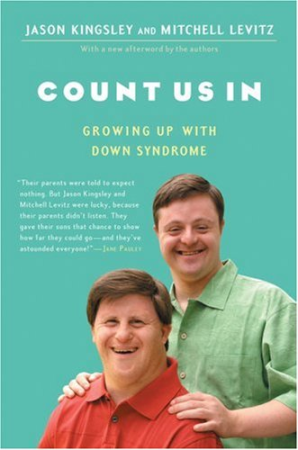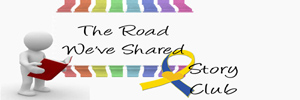Jason Kingsley, Mitchell Levitz

At ages nineteen and twenty-two, respectively, Jason Kingsley and Mitchell Levitz shared their innermost thoughts, feelings, hopes, and dreams, their lifelong friendship―and their experiences growing up with Down syndrome. Their frank discussion of what mattered most in their lives―careers, friendships, school, sex, marriage, finances, politics, and independence―earned Count Us In numerous national awards, including the EDI Award from the National Easter Seal Society. More important, their wit, intelligence, candor, and charm made a powerful and inspirational statement about the full potential of people with developmental disabilities, challenging prevailing stereotypes.
Now, thirteen years later, the authors discuss their lives since then―milestones and challenges, developments expected and unexpected―in a new afterword.
Amy on Goodreads wrote:I've never read a book by people with Down Syndrome before, and haven't gotten to meet many people with Down Syndrome either, so it was a real pleasure to get to meet and understand what these two young men are thinking and feeling on a variety of topics from having Down Syndrome, school and interacting with others, what their dreams are for their future, how they feel about women, marriage, and children, etc.
It was a hard book to sit down and read front to back because the book was structured as a series of quotes from both boys or conversations between them and their family members, and also because the way they phrase things is different from what I am used to, so I instead enjoyed reading a few chapters a day.
I was a little taken aback at some of Jason's attitudes towards women at that time, but I appreciate that he was a high school student at that time and may have matured in his viewpoints since then - I know I am very different from when I was a high-schooler! People with strong religious convictions may prefer to read this book before handing it off to their teen with DS, since the views are largely secular.
This was a valuable and unique look inside the heads of two strong young men who are working hard to be accepted and beloved contributors to society, and I am so glad they wrote this book to share their thoughts with us.
This book captured my attention because I have a younger sister with Down syndrome (now almost 30), so I was interested in knowing how other adults with this genetic disorder feel about their disability. First of all, let me say 'Bravo!' to the two gentlemen who wrote this (and to their parents who raised them). They are incredibly intelligent, high-functioning, and driven individuals. They had already received many accolades and accomplished so much when this was written (at 19 and 22 years of age). (And it is made clear how highly they think of themselves for this too) 😉 The spectrum of how one can function with DS, however, is quite broad, and it is obvious that these men are special. I particularly enjoyed the Afterward written by them twelve years later updating the reader on what life events had taken place.
That said, it is not actually written by them; they were interviewed and their answers were transcribed verbatim. Therefore, it can be a little difficult to read since their language skills are a bit different. I feel it was redundant in many areas. The book's chapters are organized by subject matter but the boys were interviewed over the course of two years, so it is not in chronological order and that got very confusing for me. I thought they were contradicting themselves at times, but then I realized that was a statement said under a different circumstance two years prior. It might have read easier to just transcribe it chronologically even though the subject matter would overlap.
Overall, the 'moral of the story' is that people with disabilities (especially those with DS) want to be taken seriously. They want to be asked for their opinions, given opportunities to work and succeed, and most of all the ability to become as independent as they can






Leave a Reply